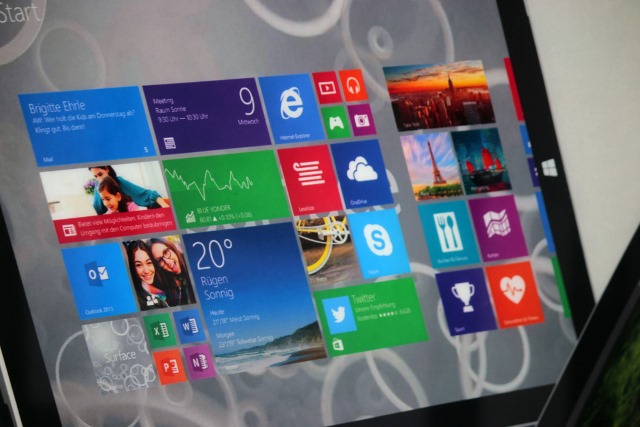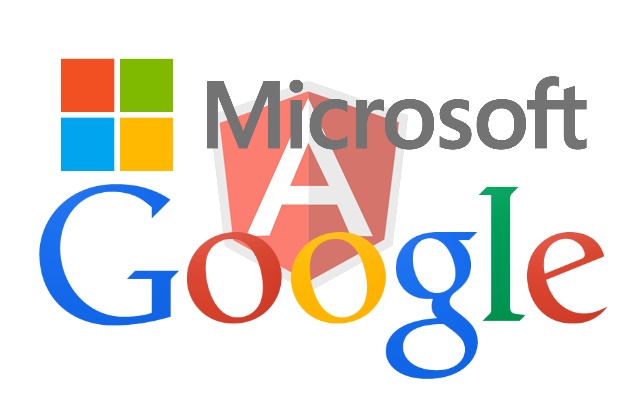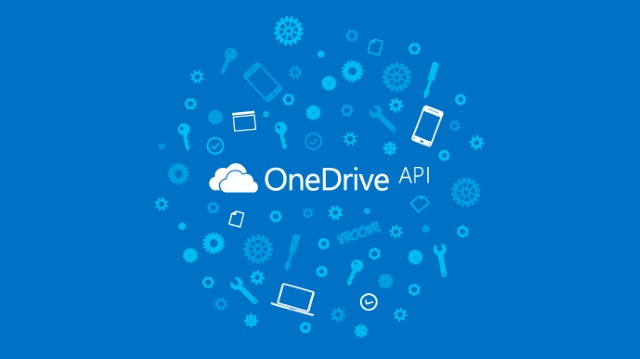
Microsoft releases Windows 10 SDK tools for developers
It has been a long time coming, but Microsoft has finally released the SDK for Windows 10 -- just ahead of next month's Build. Users have been playing around with various builds of Windows 10 Technical Preview, but this is the first chance developers have had to get hands on with the tools they'll need to create apps for the latest version of Microsoft's operating system.
The Windows 10 Technical Preview tools and Visual Studio 2015 CTP6 can be downloaded by Windows Insiders, and it gives developers the chance to try out the tools and provide feedback with the first technical preview. Templates are provided to make it easy to get started with the development of universal apps, and Microsoft is keen for developers to get to work.

Google starts vetting Android apps and implements age rating system
For a long time now Google Play has been home to just about any sort of app imaginable. Apps covering every subject under the sun are available, with quality ranging from atrocious to incredible. To help sort the wheat from the chaff, Google has announced two important changes to the way apps appear in the store.
Apps that are submitted to Goole Play are now subject to a review process, and an age rating system is being introduced to help indicate the target audience for apps. Google says this will help to weed out "violations of our developer policies earlier in the app lifecycle".

Microsoft launches Office 2016 IT Pro and Developer Preview
Hot on the heels of Office 2016 Mac Preview, Microsoft today launched Office 2016 Preview for developers and IT professionals. We've already heard a little about the direction in which the office suite is heading but -- leaks aside -- this is the first time most of the suite has been seen outside of private testing.
Microsoft is a company that is all about previews nowadays; the days of not having a clue what will appear in the next version of apps are gone. There's the disclaimer that "this early build doesn’t yet contain all the features we're planning to ship in the final product", but it's still an intriguing taster of what's to come.

Apple releases a public beta of iOS 8.3 -- here's how to get it
With Microsoft we've become used to the idea of publicly available preview builds of Windows 10 for desktop and phone. Now Apple is following suit and making iOS 8.3 available as a public beta. This is the first time a public beta of iOS has been released, although Apple has tried the same tactic with betas of OS X.
The beta is in the process of rolling out at the moment, so you may not be able to grab yourself the bits just yet, but you can get yourself in line. What is there to look forward to? Not much at the moment, apart from wireless CarPlay and new emoji. Here's how to grab the beta.

Time to migrate to GitHub as Google Code closes
After nine years, Google Code is closing down. Starting today, it is no longer possible to create new projects, and over the course of the coming ten months, the service will be mothballed. Google Code was Google's attempt to help the open source community by offering somewhere to host projects, but the growth of the likes of GitHub and Bitbucket has taken its toll and Google Code has filled up with spam and abuse.
Competition in the world of project hosting has become fierce, and Google feels it's time to pass on the baton rather than fighting for attention. Google has itself moved many of its own open source projects to GitHub. Don't panic if you’re not quite ready to jump ship -- there's still a little time to play with.

Developing apps for Apple Watch was like 'walking in the dark'
The Apple Watch was announced just a couple of days ago, and the focus has been very much on the hardware so far. But battery life and the amount of storage aside, this is an Apple product, and that means apps are central to its success. Just like the iPhone and iPad, the Apple Watch is a platform on which developers can work their magic.
One such developer is Christoph Burgdorfer, the man behind -- amongst other things -- WhereAreYou App (Locate a friend), a free app that does very much what it says on the tin. It started life as an iPhone and Android app, but the emergence of Apple Watch opens up another possibility. I caught up with Christoph to chat about what it was like to develop for an unreleased product, and whether Apple got it right with the Apple Watch.

Microsoft and Google working together on Angular 2 JavaScript framework
There are unlikely partnerships, and there are unlikely partnerships -- Google and Microsoft certainly make for strange bedfellows. At developer conference ng-conf in Salt Lake City, Google's Angular team revealed that it has been working with the TypeScript Team from Microsoft to produce Angular 2.
The worlds of TypeScript and AtScript have converged, resulting in the collaborative effort that is Angular 2. The new version of the JavaScript framework will be written in TypeScript and will be used to develop the next generation of web sites and web apps.

Offline is not just another mobile feature
Every discussion on mobile-first development misses out on one of its most important and least understood characteristics: Mobile apps need to work offline.
The fundamental premise of mobility is that the technology should work everywhere. And that means everywhere. Imagine if you couldn’t access iTunes on the subway, or look up your next meeting on your calendar in an elevator, or a phone number in your contacts while trying to make an urgent call from the road. And forget being able to access anything when you are 15,000 feet in the sky.

Embed Twitter-hosted videos on your own site with new widget
It just became a whole lot easier to embed Twitter-hosted videos on websites. A newly launched widget makes it possible to add the video from a tweet to a website without the need to embed the entire tweet. It's a neat-looking solution that makes it simple to embed videos without unnecessary, distracting page furniture.
It works in just the same way as embedding an entire tweet, and it provides a way for Twitter to drive traffic back to its own site rather than other video services, whilst simultaneously making life easier for embedders and helping to pull in followers from other sites.

Android apps crash more than iOS apps
With MWC 2015 underway in Barcelona, the tech world is laser focused on mobile devices at the moment. Whether your mobile device preference is an iPhone, an Android handset or a Windows Phone device, your decision will have been swayed by a number of things -- price, brand reputation, knowledge of the ecosystem, and range of apps. Android may be the most popular choice at the moment, but this appears to be in spite of problems the platform suffers form.
A new report from Crittercism suggests that Android apps crash more frequently than their iOS counterparts. But this is not the only bad news for Google's mobile operating system; the report also finds that the fragmentation of Android persists.

Exciting new experimental apps emerge from Microsoft Garage
Microsoft Garage is home to all manner of innovative projects from Microsoft employees, and today a new batch of projects has been unveiled. As Garage is a cross-platform venture, there are apps for Windows Phone, Android and desktop Windows, and the myriad tools cover everything from app development to the weather.
On the productivity front, Mouse Without Borders is a name that might seem familiar. Strictly speaking, this is a re-release rather than a new release, and the utility makes it possible to control up to four computers with a single keyboard and mouse by acting like a virtual KVM switch. If this isn’t your sort of thing, there are plenty more tools to explore.

Google unveils a redesign after 1,000 Chrome Experiments
Chrome Experiments is now entering its sixth year and is home to hundreds of coding experiments that help to make the Internet a more fun and enjoyable place. Ten hundred in fact. To celebrate reaching the milestone of 1,000 experiments, Google is not only launching a new experiment that shows off all of the rest, but also rolling out a redesign.
The redesign is about more than just a new look, it's also about emphasizing the fact that Google wants to be part of every platform available. It's a Polymer-based redesign that works equally well on large-screen-desktops and small-displayed mobiles and is Google's new way to showcase the best in HTML5 and JavaScript.

Microsoft releases OneDrive API for cross-platform cloud storage development
Today Microsoft launches a new OneDrive API, opening up its cloud storage service to a wider range of developers. The API can be used to integrate OneDrive into apps running on Android, Windows, iOS and the web, and there is a focus on efficiency with minimal calls needed to keep files in sync.
The API has already started to roll out to a number of Microsoft apps, and the company is keen to ensure that all developers have access to the same set of tools. There are a number of new features to be found in the API which can be easily added to existing apps and services.

Demand for Linux developers on the rise
The demand for Linux developers has jumped seven percent in comparison to last year, a study has shown.
The 2014 Linux Jobs Report shows that hiring managers at tech-powered companies are focusing more attention on Linux talent, and that’s reverberating in the market, with stronger than average salary increases to those working with the OS.

HTTP/2 has been approved, bringing the promise of a more efficient web
The web could be in line for a speed boost as the HTTP/2 standard edges closer to being finalized. The updated standard will be the first major alteration to the protocol since the late 1990s, and it includes a number of important updates that should help to make life online faster and more enjoyable.
Although HTTP/2 is yet to be published as a completed standard, it is already supported by some web browsers including Chrome and Firefox. However, it won't be until the standard is far more widely adopted that the real benefits will be felt.
